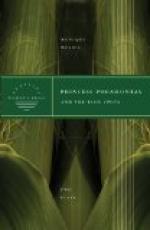“I thank thee, great Powhatan, for thy words of kindness and the good news thou bringest me. In truth if thou wilt be to me a father, I will be to thee a son, and there shall be peace between Werowocomoco and Jamestown. If thou wilt send men with me to show me the way they shall return with presents for thee.”
Powhatan gave certain orders and twelve men stepped forward and laid aside their sacrificial masks and announced themselves ready to accompany the paleface. Smith had not imagined that he could leave that night, but he was so eager to be off that he lost no time in his farewells.
They set forth into the forest which at first was not dense, and along its edge were clearings where the summer’s maize had grown. Then the trees grew closer together, and to Smith there appeared no path between them, but his guides strode quickly along with no hesitation, though the night was a dark one. Six of the Indians went in front of him and six behind. There was no talking, only the faint sound from the Englishman’s boots and his stumbling against trunks or rocks broke the silence. There was little chance of an enemy’s coming so near to the camp of The Powhatan, nevertheless the Indians observed the usual caution.
To John Smith there was something ghostly about this excursion by night, through an unknown country, with unknown men. He could not help wondering whether he had understood correctly all that Powhatan had said, or whether he dared believe he had meant what he said, or if he had not planned to kill him in the wilderness away from any voice to speak in his favor. Even though the werowance himself were acting in good faith, might not others of the chiefs have plotted to put an end to the white man whose coming and whose staying were so beyond their fathoming? In spite of these thoughts he went on apparently as unconcernedly as though he were strolling along the king’s highway near his Lincolnshire home.
The call of some animal, a wildcat perhaps, brought the little company to a hurried standstill, and a whispered consultation. The sound might really come from some beast, Smith knew; on the other hand, it might be either a signal made by foes of the Powhatans or the call of another party of their tribe about to join them. In the latter case it boded ill for him. He clasped a stone knife he had managed to secrete at Werowocomoco. He could not overhear what the Indians were saying, but they were evidently arguing. Then when they seemed to have come to some decision, they started on once more.
Though the forest was so sombre. Smith’s eyes had grown more accustomed to the blackness and he began to distinguish between the various shades of darkness. Once or twice he thought he saw to the side of them another figure, moving or halting as they halted, but when he looked fixedly he could distinguish nothing but the trunk of some great tree.




